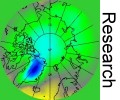 |
 |
Development, properties and impacts
We study how a storm is formed from a low pressure system and where such storms occur. The damage caused depends not only on the storm force but also on the behaviour of the people. [more ...]
|
 | | Conditions for stormy times
The Earth's rotation, high water temperatures and low wind shear let cyclones grow. The multi-decadal oscillation of global weather patterns also has an influence on the occurence of storms and makes it difficult to estimate the human influence. [more ...]
|
 | | Warning for tomorrow
We cannot assign the unusually strong hurricane seasons 2004 and 2005 to climate change. However, it is likely that the destructive forces of storms increase significantly in a warmer world. We have a look at the most recent estimations of climate research. [more ...]
|
 | | Links
Low pressure systems, storms and their impacts are not only interesting meteorology topics, but they are for many peoople of life determining importance. For this reason, there are many websites including explanations, observations and forecasts of such systems. [more ...]
|
 | | Information for teachers
This special edition can be used in classes in the context of "weather / general atmospheric circulation". The ideal starting point is the topic: pressure systems and cyclones.
It is offered as a short release without the categories 'activities' and'further information' for integration into classes.
Please click here in order to access the "material corner".
|







